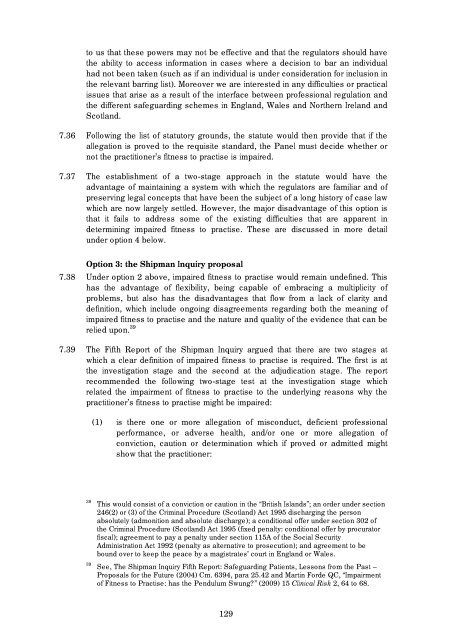Regulation of Health and Social Care Professionals Consultation
Regulation of Health and Social Care Professionals Consultation
Regulation of Health and Social Care Professionals Consultation
Create successful ePaper yourself
Turn your PDF publications into a flip-book with our unique Google optimized e-Paper software.
to us that these powers may not be effective <strong>and</strong> that the regulators should have<br />
the ability to access information in cases where a decision to bar an individual<br />
had not been taken (such as if an individual is under consideration for inclusion in<br />
the relevant barring list). Moreover we are interested in any difficulties or practical<br />
issues that arise as a result <strong>of</strong> the interface between pr<strong>of</strong>essional regulation <strong>and</strong><br />
the different safeguarding schemes in Engl<strong>and</strong>, Wales <strong>and</strong> Northern Irel<strong>and</strong> <strong>and</strong><br />
Scotl<strong>and</strong>.<br />
7.36 Following the list <strong>of</strong> statutory grounds, the statute would then provide that if the<br />
allegation is proved to the requisite st<strong>and</strong>ard, the Panel must decide whether or<br />
not the practitioner’s fitness to practise is impaired.<br />
7.37 The establishment <strong>of</strong> a two-stage approach in the statute would have the<br />
advantage <strong>of</strong> maintaining a system with which the regulators are familiar <strong>and</strong> <strong>of</strong><br />
preserving legal concepts that have been the subject <strong>of</strong> a long history <strong>of</strong> case law<br />
which are now largely settled. However, the major disadvantage <strong>of</strong> this option is<br />
that it fails to address some <strong>of</strong> the existing difficulties that are apparent in<br />
determining impaired fitness to practise. These are discussed in more detail<br />
under option 4 below.<br />
Option 3: the Shipman Inquiry proposal<br />
7.38 Under option 2 above, impaired fitness to practise would remain undefined. This<br />
has the advantage <strong>of</strong> flexibility, being capable <strong>of</strong> embracing a multiplicity <strong>of</strong><br />
problems, but also has the disadvantages that flow from a lack <strong>of</strong> clarity <strong>and</strong><br />
definition, which include ongoing disagreements regarding both the meaning <strong>of</strong><br />
impaired fitness to practise <strong>and</strong> the nature <strong>and</strong> quality <strong>of</strong> the evidence that can be<br />
relied upon. 39<br />
7.39 The Fifth Report <strong>of</strong> the Shipman Inquiry argued that there are two stages at<br />
which a clear definition <strong>of</strong> impaired fitness to practise is required. The first is at<br />
the investigation stage <strong>and</strong> the second at the adjudication stage. The report<br />
recommended the following two-stage test at the investigation stage which<br />
related the impairment <strong>of</strong> fitness to practise to the underlying reasons why the<br />
practitioner’s fitness to practise might be impaired:<br />
(1) is there one or more allegation <strong>of</strong> misconduct, deficient pr<strong>of</strong>essional<br />
performance, or adverse health, <strong>and</strong>/or one or more allegation <strong>of</strong><br />
conviction, caution or determination which if proved or admitted might<br />
show that the practitioner:<br />
38 This would consist <strong>of</strong> a conviction or caution in the “British Isl<strong>and</strong>s”; an order under section<br />
246(2) or (3) <strong>of</strong> the Criminal Procedure (Scotl<strong>and</strong>) Act 1995 discharging the person<br />
absolutely (admonition <strong>and</strong> absolute discharge); a conditional <strong>of</strong>fer under section 302 <strong>of</strong><br />
the Criminal Procedure (Scotl<strong>and</strong>) Act 1995 (fixed penalty: conditional <strong>of</strong>fer by procurator<br />
fiscal); agreement to pay a penalty under section 115A <strong>of</strong> the <strong>Social</strong> Security<br />
Administration Act 1992 (penalty as alternative to prosecution); <strong>and</strong> agreement to be<br />
bound over to keep the peace by a magistrates’ court in Engl<strong>and</strong> or Wales.<br />
39 See, The Shipman Inquiry Fifth Report: Safeguarding Patients, Lessons from the Past –<br />
Proposals for the Future (2004) Cm. 6394, para 25.42 <strong>and</strong> Martin Forde QC, “Impairment<br />
<strong>of</strong> Fitness to Practise: has the Pendulum Swung?” (2009) 15 Clinical Risk 2, 64 to 68.<br />
129
















